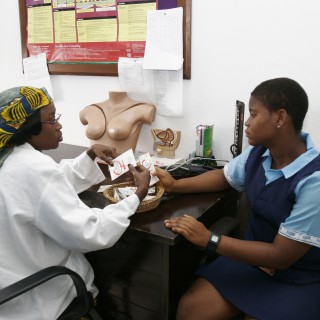Despite the sensitivity and controversy that surrounds frank, honest discussion and action to safeguard adolescents’ sexual and reproductive health, the global community, through the Cairo and Beijing plans for action, has agreed to many principles aimed at reducing adolescent vulnerability to HIV/STD and unintended pregnancy. Highlighted below are principles that appeared first in the Cairo Programme of Action at the International Conference on Population and Development and were later reiterated by the Beijing Platform at the fourth World Conference on Women.
Among the stated goals are to:
- Protect and promote the rights of adolescents to sexual and reproductive health information and services, and reduce the number of adolescent pregnancies.
In the realm of policy and law:
- Develop integrated service, information and educational programs for adolescents that address adolescent sexual and reproductive health issues, including unwanted pregnancy, unsafe abortion, STDs, and HIV/AIDS.
- Safeguard the rights of adolescent to privacy, confidentiality, respect and informed consent, with the support and guidance of their parents and in line with the Convention on the Rights of the Child.
- Provide materials, financial, and governmental organizations in order to strengthen their involvement in the design, implementation, and evaluation of sexual and reproductive health programs and policies that concern them, including on teenage pregnancy, sexually education, STDs, and HIV/AIDS.
In the area of services and training:
- Reorient health education and services to meet the needs of adolescents. Integrated sexual education and services for young people and should include: family planning information, counselling, and services for sexually active adolescents as well as promotion of voluntary abstinence: counselling on gender relations, violence against adolescents and sexual abuse, sexual and reproductive health and responsible behavior, and sexuality education and information for the prevention of STDs and HIV/AIDS: confidential mental health services for young girls and women who have experienced any form of violence, and prevention and treatment of sexual abuse and incest.
- Train health care providers on adolescents’ needs and perspectives in the area of sexual and reproductive health, including of the need to respect their right to privacy, confidentiality, and informed consent to avoid judgmental attitudes.
And finally, in terms of public information, education, and research:
- Develop an integrated approach to the general and reproductive health, education, and social needs of the girls and young women, by establishing school-and community-based programs on a whole range of health issues, including on basic health and nutrition, the physiology of reproductive, reproductive and sexual health, family planning, STDs, and HIV/AIDS prevention.
- Special attention should be given to the sexual and reproductive health needs of adolescents in order to develop suitable policies and programs and appropriate technologies to meet their needs.
Source: Family Care International. 1995 Commitments to Sexual and Reproductive Health and Rights for All: Framework for Action. New York: Family Care International.







You must be logged in to post a comment.